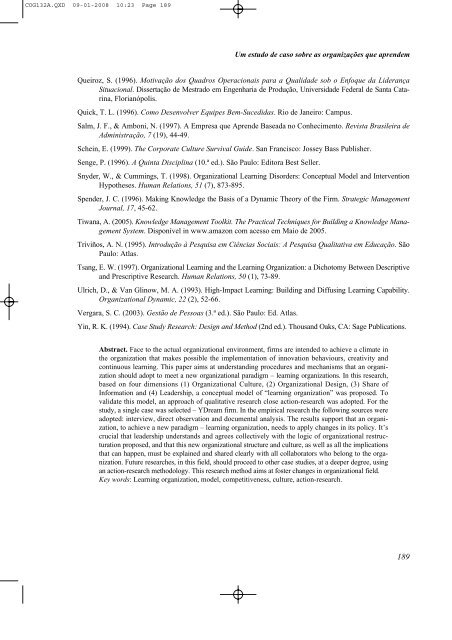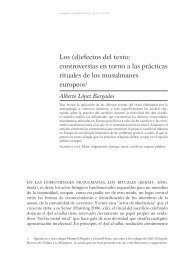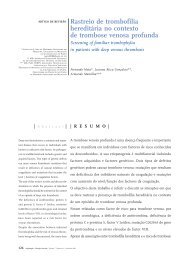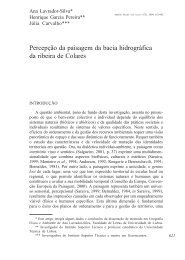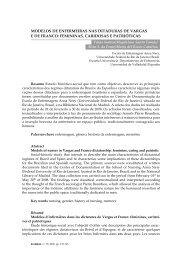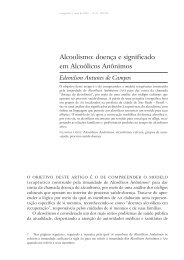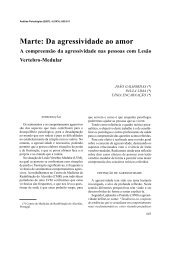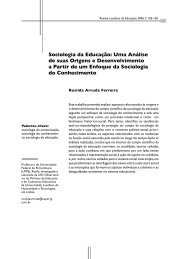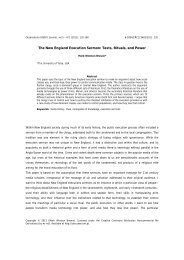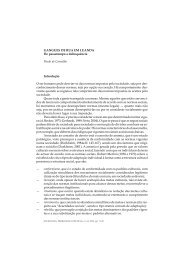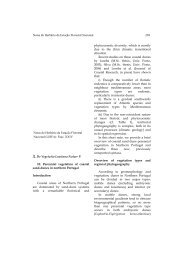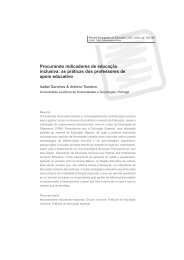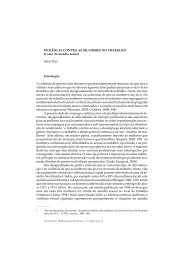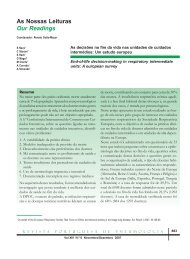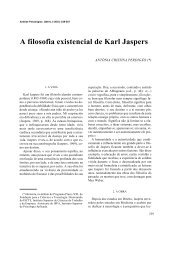Um estudo de caso sobre as organizações que aprendem - SciELO
Um estudo de caso sobre as organizações que aprendem - SciELO
Um estudo de caso sobre as organizações que aprendem - SciELO
Create successful ePaper yourself
Turn your PDF publications into a flip-book with our unique Google optimized e-Paper software.
COG132A.QXD 09-01-2008 10:23 Page 189<br />
<strong>Um</strong> <strong>estudo</strong> <strong>de</strong> <strong>c<strong>as</strong>o</strong> <strong>sobre</strong> <strong>as</strong> organizações <strong>que</strong> apren<strong>de</strong>m<br />
Queiroz, S. (1996). Motivação dos Quadros Operacionais para a Qualida<strong>de</strong> sob o Enfo<strong>que</strong> da Li<strong>de</strong>rança<br />
Situacional. Dissertação <strong>de</strong> Mestrado em Engenharia <strong>de</strong> Produção, Universida<strong>de</strong> Fe<strong>de</strong>ral <strong>de</strong> Santa Catarina,<br />
Florianópolis.<br />
Quick, T. L. (1996). Como Desenvolver Equipes Bem-Sucedid<strong>as</strong>. Rio <strong>de</strong> Janeiro: Campus.<br />
Salm, J. F., & Amboni, N. (1997). A Empresa <strong>que</strong> Apren<strong>de</strong> B<strong>as</strong>eada no Conhecimento. Revista Br<strong>as</strong>ileira <strong>de</strong><br />
Administração, 7 (19), 44-49.<br />
Schein, E. (1999). The Corporate Culture Survival Gui<strong>de</strong>. San Francisco: Jossey B<strong>as</strong>s Publisher.<br />
Senge, P. (1996). A Quinta Disciplina (10.ª ed.). São Paulo: Editora Best Seller.<br />
Sny<strong>de</strong>r, W., & Cummings, T. (1998). Organizational Learning Disor<strong>de</strong>rs: Conceptual Mo<strong>de</strong>l and Intervention<br />
Hypotheses. Human Relations, 51 (7), 873-895.<br />
Spen<strong>de</strong>r, J. C. (1996). Making Knowledge the B<strong>as</strong>is of a Dynamic Theory of the Firm. Strategic Management<br />
Journal, 17, 45-62.<br />
Tiwana, A. (2005). Knowledge Management Toolkit. The Practical Techni<strong>que</strong>s for Building a Knowledge Management<br />
System. Disponível in www.amazon com acesso em Maio <strong>de</strong> 2005.<br />
Triviños, A. N. (1995). Introdução à Pesquisa em Ciênci<strong>as</strong> Sociais: A Pesquisa Qualitativa em Educação. São<br />
Paulo: Atl<strong>as</strong>.<br />
Tsang, E. W. (1997). Organizational Learning and the Learning Organization: a Dichotomy Between Descriptive<br />
and Prescriptive Research. Human Relations, 50 (1), 73-89.<br />
Ulrich, D., & Van Glinow, M. A. (1993). High-Impact Learning: Building and Diffusing Learning Capability.<br />
Organizational Dynamic, 22 (2), 52-66.<br />
Vergara, S. C. (2003). Gestão <strong>de</strong> Pesso<strong>as</strong> (3.ª ed.). São Paulo: Ed. Atl<strong>as</strong>.<br />
Yin, R. K. (1994). C<strong>as</strong>e Study Research: Design and Method (2nd ed.). Thousand Oaks, CA: Sage Publications.<br />
Abstract. Face to the actual organizational environment, firms are inten<strong>de</strong>d to achieve a climate in<br />
the organization that makes possible the implementation of innovation behaviours, creativity and<br />
continuous learning. This paper aims at un<strong>de</strong>rstanding procedures and mechanisms that an organization<br />
should adopt to meet a new organizational paradigm – learning organizations. In this research,<br />
b<strong>as</strong>ed on four dimensions (1) Organizational Culture, (2) Organizational Design, (3) Share of<br />
Information and (4) Lea<strong>de</strong>rship, a conceptual mo<strong>de</strong>l of “learning organization” w<strong>as</strong> proposed. To<br />
validate this mo<strong>de</strong>l, an approach of qualitative research close action-research w<strong>as</strong> adopted. For the<br />
study, a single c<strong>as</strong>e w<strong>as</strong> selected – YDream firm. In the empirical research the following sources were<br />
adopted: interview, direct observation and documental analysis. The results support that an organization,<br />
to achieve a new paradigm – learning organization, needs to apply changes in its policy. It’s<br />
crucial that lea<strong>de</strong>rship un<strong>de</strong>rstands and agrees collectively with the logic of organizational restructuration<br />
proposed, and that this new organizational structure and culture, <strong>as</strong> well <strong>as</strong> all the implications<br />
that can happen, must be explained and shared clearly with all collaborators who belong to the organization.<br />
Future researches, in this field, should proceed to other c<strong>as</strong>e studies, at a <strong>de</strong>eper <strong>de</strong>gree, using<br />
an action-research methodology. This research method aims at foster changes in organizational field.<br />
Key words: Learning organization, mo<strong>de</strong>l, competitiveness, culture, action-research.<br />
189


